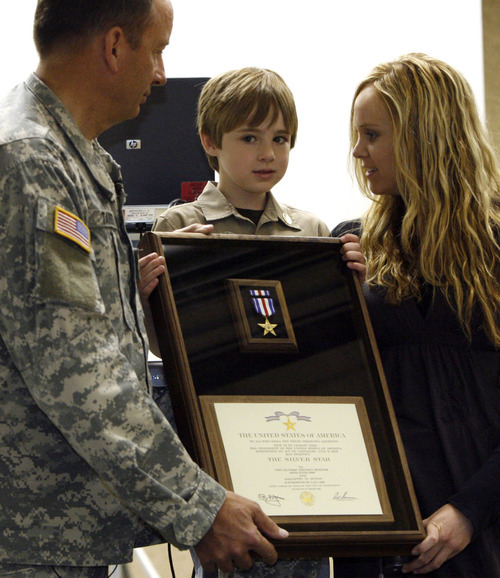This is an archived article that was published on sltrib.com in 2011, and information in the article may be outdated. It is provided only for personal research purposes and may not be reprinted.
Jase Spargur's father was a hero.
That's what the Army told the young boy after his dad's death in Afghanistan. And that's why, on a crisp spring morning in 2009, officers descended on Kanesville Elementary School in West Haven to present Jase with the Silver Star on behalf of his fallen father.
The citation commended 1st Lt. Jonathan P. Brostrom for his "incredible valor, competence and unstoppable drive," and attested that the 24-year-old Army officer's actions "saved the lives of his men and held the ground from enemy forces."
No one is contesting Brostrom's conduct in the July 13, 2008, Battle of Wanat, in which he and nine other soldiers were killed when their remote outpost was ambushed by hundreds of Taliban guerillas. But a new report by the Army's Combat Studies Institute suggests that the young platoon commander may have made some mistakes, before the battle, that gave the enemy the advantages it needed to coordinate the deadly assault. And for the family of Brostrom's son, now 8 years old, that's not acceptable.
"They're blaming a dead first lieutenant for all the failures at Wanat," said Jase's grandfather, Dave Spargur, who spent nearly 30 years in the Air Force. "That's just not right, because they never should have been there to begin with."
The Army abandoned Wanat days after the attack and has not returned — a decision that Spargur says is a tacit acknowledgement that the position in the mountain village near the Pakistan border was indefensible from the start.
In a forward to the 257-page report, Brig. Gen. Sean McFarland argues that the document, considered the Army's "official history" of the battle, "does not seek to draw final conclusions or to second guess decisions made before or during the heat of battle."
However, the report's authors go on to suggest that Brostrom's decision about where to build an observation post, and his failure to order patrols immediately upon arriving at Wanat, may have given Taliban rebels the room they needed to mount the ambush.
Officers from the institute have been traveling across the United States in recent weeks to explain their findings to the families of those killed in the battle. They were in Utah on Monday to meet with Brostrom's family.
Brostrom's father, David, met with the Army team last week at his home in Hawaii.
The retired Army colonel says he told his visitors that their report fails to reflect the totality of mistakes that led a small, lightly armed and poorly supplied platoon to be placed in Wanat in the waning days of a 15-month tour of duty.
Those criticisms, substantiated in earlier Army investigations of the battle, are missing from what the institute called its "comprehensive" report.
Brostrom said he understands that a fair review might find instances in which soldiers on the ground could have made different decisions in the four days they spent in Wanat before the attack.
But any tactical failures are eclipsed, he said, by the failures that came from decision-makers well up the chain of command.
"The platoon was given a mission that was untenable," Brostrom said, noting that earlier investigations had found that, in spite of the hopelessness of their situation, the soldiers had pushed onward with impressive results in just a few days. "The fact is that the history is wrong and they need to correct it."
He has received support for his position from several members of Congress, including Sen. Jim Webb, D-Va., who wrote a letter to the Secretary of the Army calling the report "flawed."
Brostrom said the Army has not responded to Webb's request for a revised report and released the report online even before it finished briefing the families of the fallen.
Combined Arms Center director William Robertson said he could not discuss the report without permission from the Army's strategic communications office. Calls to that office were not immediately returned.
Spargur said that he'd like to leave this chapter of his family's life behind — but he knows that his grandson will not be able to do so.
"We're trying to shelter him from all of this right now," Spargur said. "But as he gets older, he's going to want to understand what happened to his father. And we just want to make sure that he knows that whole truth about what happened."
The Battle of Wanat
You can read the Army's report on the Battle of Wanat at http://usacac.army.mil/cac2/csi/. —
The Fallen
To see the list of Utah's fallen soldiers, go to http://bit.ly/gMeYd6



